Before October 8th, most Brazilians had only heard about the Marajó archipelago which lies at the mouth of the Amazon, due to the region’s famous ceramics. But on this date, at a religious service in an evangelical church in the city of Goiânia, Marajo’s population found itself thrown headlong into Bolsonarism’s fake news machine and made the front pages of the Brazilian and international press. In a service that was clearly intended to influence the election, at the Assembleia de Deus Ministério Fama (Assembly of God Fama Ministry), Damares Alves stood on the pulpit and glibly claimed that among other forms of torture, the archipelago’s children have their teeth pulled out so as to make oral sex easier and are victims of sexual exploitation and international human trafficking. The newly elected senator who was formerly the Minister of Women, Family and Human Rights in Jair Bolsonaro’s government, didn’t offer any proof of her accusations or explain why she had never denounced or tackled this crime during the more than three years that she was a minister in Bolsonaro’s government. To the contrary. Damares claimed the current president is carrying out “the largest regional development program on Marajó Island.”
Her message was clear: in order to save the little children of Marajó, who had no teeth so that they could perform oral sex on adults, it was necessary to reelect Bolsonaro on October 30. SUMAÚMA went to Marajó to check Damares’ speech. We found the Bolsonaro government has indeed been engaged in concrete actions in the archipelago, but the said actions are aimed at dismantling the mechanisms responsible for the population’s social assistance, which has a marked impact on children. SUMAÚMA’s report found children who have their teeth, but very little or nothing to chew with them, and who are among the 33 million Brazilians who go hungry.
The transfer of resources, particularly on the social assistance front, has declined in 16 of Marajó’s 17 municipalities. With 100,000 inhabitants, Breves is the archipelago’s largest town. In 2019, it received more than 790,000 reais, but in 2022, the amount was down by almost 50%, to 405,000 reais. In Melgaço, which has the lowest Human Development Index in Brazil, the cut was even more drastic, from 514,000 reais in 2019 to just over 179,000 reais this year.
Damares Alves did not talk about these real-life horrors. In her electoral sermon that made the world’s headlines, she declared: “You have no idea of his [Bolsonaro’s] spiritual understanding. We went to Marajó Island. And there we discovered that Brazilian children were being trafficked there. Marajó borders the world, Suriname, French Guyana. I am going to tell you something that I can now talk about. We have images of Brazilian children, who are 3 or 4 years old, who, when they are taken across the borders after having been kidnapped, have had their teeth pulled out so that they don’t bite during oral sex. This is the country that we still have, brothers and sisters.”
Despite her claim to have evidence, the former minister has not presented videos or any other proof. The Federal Public Prosecution Service has guaranteed that, in 30 years of investigations, it has never received any complaints like those recounted by the former government minister.
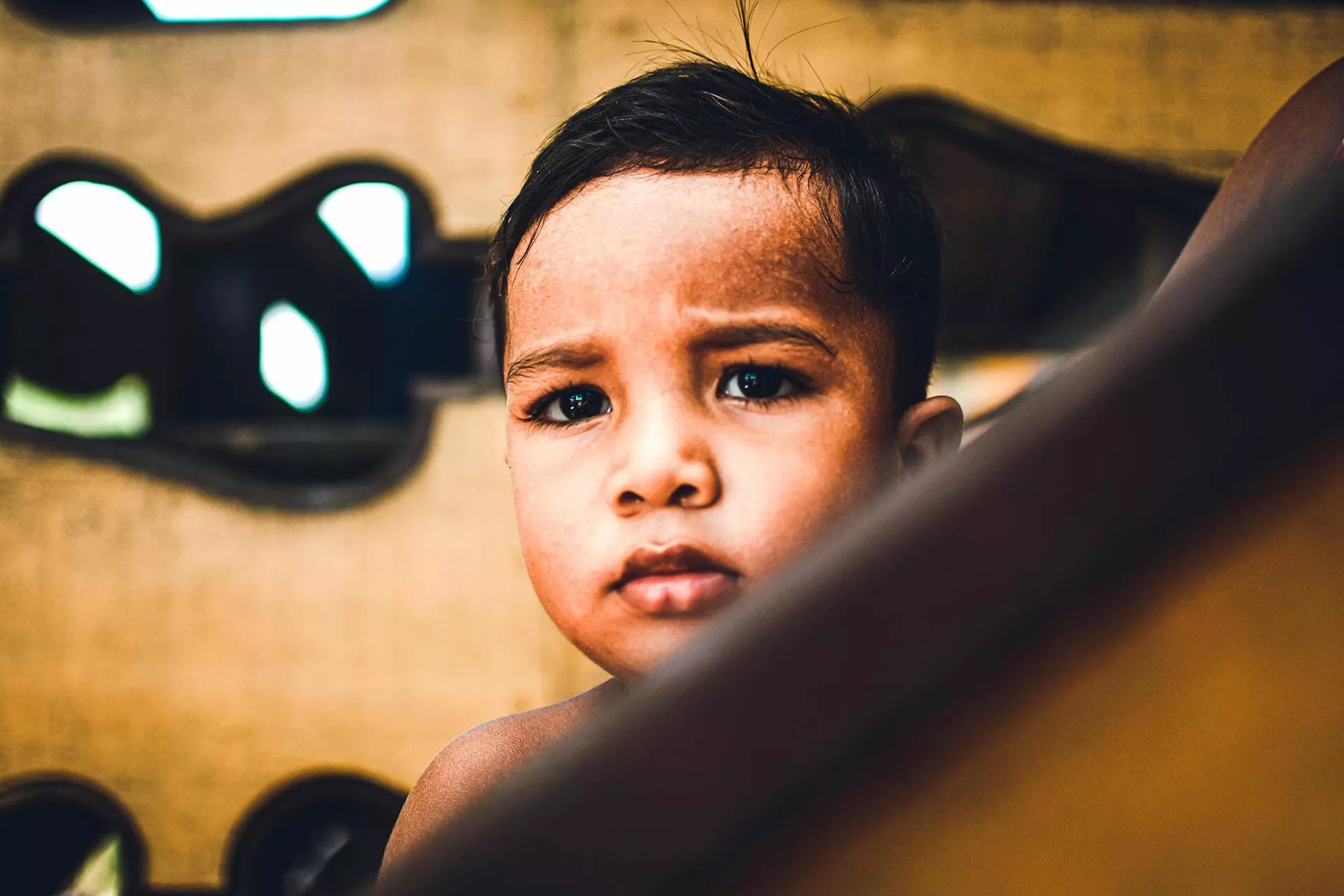
Criança da Comunidade Nossa Senhora de Nazaré, a duas horas da cidade de Breves, na Ilha de Marajó. Foto: Jacy Santos/Ondejacyviu/SUMAÚMA
Marajó is the planet’s largest archipelago situated between the river and the sea. Before the Portuguese invaded, this was home to native peoples, such as the Aruãs, Sacacas, Marauanás, Anajás, and Muanás. The refined pottery of the region’s jars and vases, which became world famous, is a legacy of the indigenous people. Colonization, which proved to be disastrous and deadly throughout the entire Amazon region, was consolidated by the Jesuits, starting in the 17th century. By the end of the 18th century, almost the entire indigenous population had been wiped out during the process of invasion, extraction, and colonization by the Europeans.
Nowadays, the region is controlled by white landowners, cattle ranchers, and loggers. There is also cheese production and açaí extraction. But there is a shortage of schools, health centers and other services the Constitution guarantees as basic rights. “Our current production model looks at the Amazon region and at Marajó, and only sees what is here rather than who is here,” complains Sister Carla Vasconcelos, from the Brazilian Justice and Peace Commission. “People are not poor or born poor, they are made poor by the social conditions they are subjected to.”
When we arrived in Breves, we found the town’s population was angry at having been used in such a blatant way to reelect the current president. We also found neglected children as the result of a lack of funds from Bolsonaro’s government. The Unified Social Assistance System (SUAS) is responsible for the network of care for the vulnerable in the municipalities that manage the Unified Registry (CadÚnico). This is the first place that food insecure families turn to register for the Brazilian government’s current social welfare program, Auxílio Brasil, and other benefits, such as gas vouchers. In Breves, 95% of SUAS’ funds have been cut. The island has one of the worst human development levels in Brazil: It is in 5,520th place out of 5,565 towns.
The “Abrace o Marajó”, (Give Marajó a Hug) program, which Damares championed in her election-oriented evangelical service, has barely made it off of the drawing board. “This talk by Damares is irresponsible. What we are getting are a lot of reports of people going hungry. Here in Breves, it is the municipality that is sustaining the social assistance programs, because we are not receiving any transfers of funds from the federal government,” says Luce Mara Lobato, who is a social worker and a member of the Justice and Peace Commission. “Taking care of children is a way of investing in people. And this is not being done”. The social worker receives us in a private place, for fear of attacks from Bolsonaro voters.
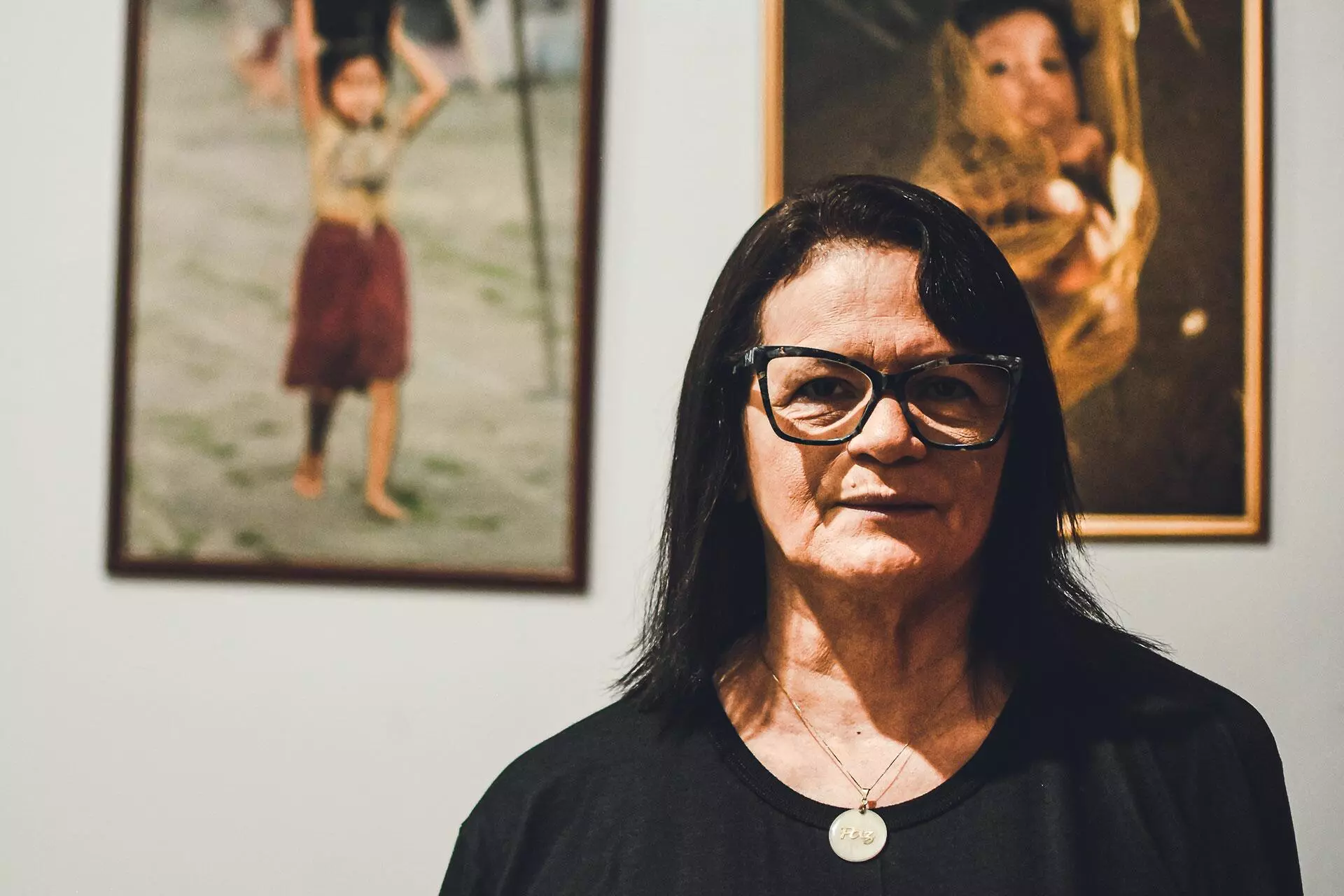
A religiosa Marie Henriqueta Ferreira Cavalcante diz que a fala de Damares é ‘desconectada da realidade’. Foto: Jacy Santos/Ondejacyviu/SUMAÚMA
Continuing our search for confirmation of the accusations that Damares made, but which she did not investigate as a minister, we also went to Nossa Senhora de Nazaré community, in the Antônio Lemos District, on the banks of the Tajapuru River, two hours from Breves. In June of this year the government of the State of Pará set up a base of the Department of Public Safety there. The place is a transportation corridor for drugs, smuggling, pirated goods, and environmental crimes. During a boat trip, we see lots of rafts transporting wood, soybeans and fuel. There are also ships carrying people and goods. However, since June 22nd, which is the date on which the Integrated Base was inaugurated, there are no records of any arrests for human trafficking or child prostitution.
President of the Dom José Luís Azcona Human Rights Institute, the nun Marie Henriqueta Ferreira Cavalcante has been working in the region for more than 11 years. She is a reference in the fight against sexual violence, carrying out grassroots work among the needy population. She helped denounce crimes that led to a Parliamentary Commission of Inquiry in 2012, to deal with cases of human trafficking on the border. The missionary has already had experience of being placed in a witness protection program when she denounced the family of a politician from Marajó for a case of rape. With all of her experience, she has never heard anything like the case described by Damares. “It is a statement that has no basis in reality,” she says. “The population is extremely needy, but making a complaint as serious as this requires something concrete so that we can take the appropriate actions, and I can only do this if I have proof.”
Standing in the pulpit, the senator-elect for the Republicans, a right-wing party, also stressed other details that were not confirmed by any other reports we heard for this article. “We discovered children who were eating mushy food so that their bowels would be empty when it came round to time for anal sex. Bolsonaro said: ‘We are going to go after all of them’. “And hell rose up against this man,” said Damares, evoking a false biblical battle to convince the evangelical faithful to reelect Bolsonaro. “The press has waged [a war against the president], the Supreme Court has waged one, and Congress has waged one. Believe me, it’s not a political war, it’s a spiritual war. And I am speaking to my church, and I have the protection of the constitution to express myself within my church. There are things I can’t talk about outside, but here I have the constitutional freedom to express my faith.”
The vice mayor of the town of Breves, Benedito Viana (PSD), says there was widespread surprise in the city at Damares’ accusations. “It has never been seen and never been heard of. Everyone was outraged and nobody has any knowledge of this in this part of the island,” he says. The archipelago is split into two parts: western Marajó and eastern Marajó. Breves is in the west. In the first round, former president Lula da Silva (PT) obtained 60.26% of the votes in the municipality (32,399 votes), while Jair Bolsonaro received 33.14% (17,819 votes).
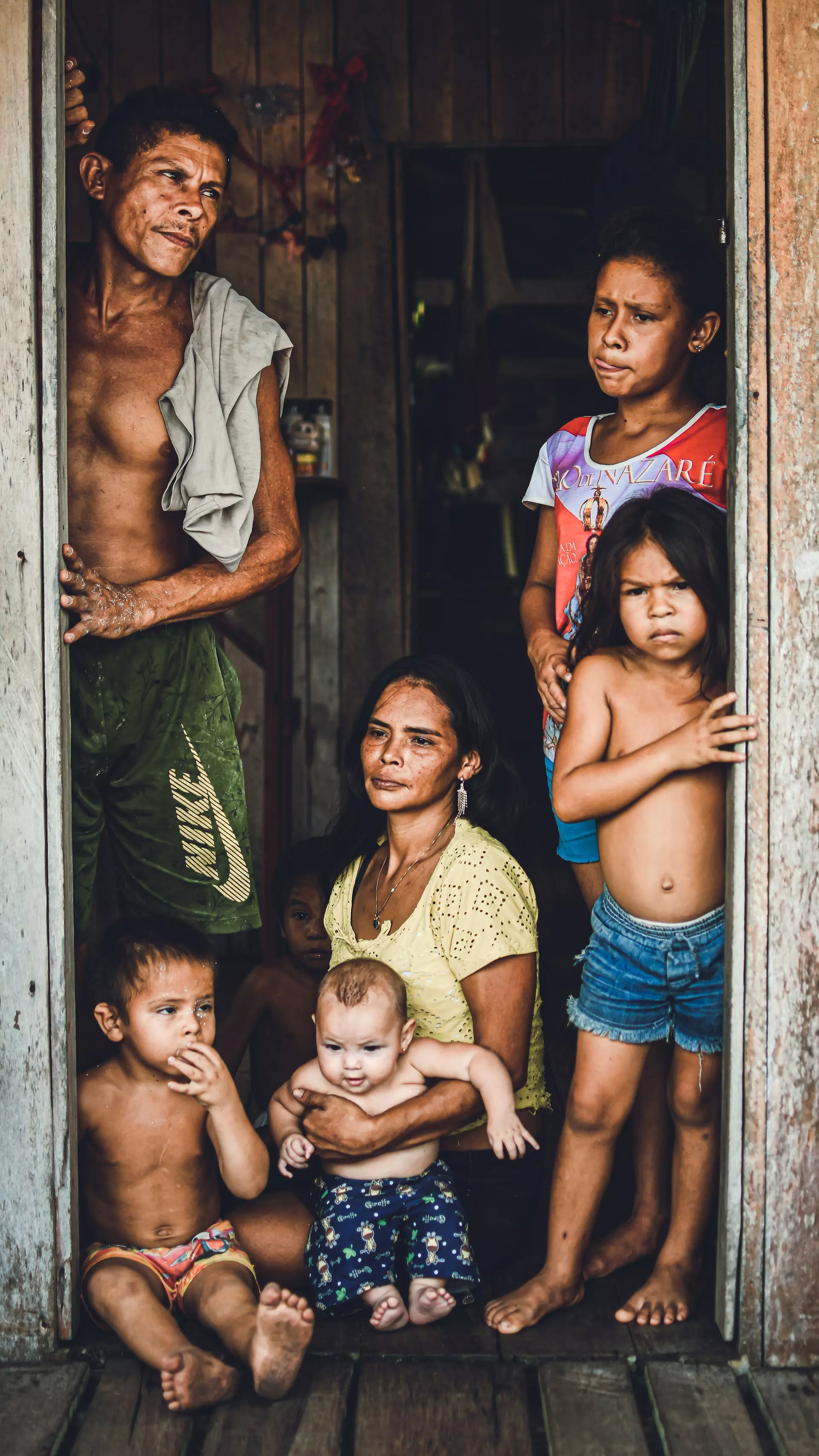
José Coaraci Souza, a esposa Michele e os filhos vivem às margens do rio Mucujubim. Eles não conhecem o programa Abrace o Marajó. Jacy Santos/Ondejacyviu
The population of Breves makes a living from growing açaí and heart-of-palm and from shrimp farming and to a lesser extent fish farming. The way to transport or access any public service is via the river. Damares has been to the region five times. Bolsonaro, once. None of the government’s visits has resulted in any sort of structured project to reduce the place’s vulnerability, nor helped lift Breves out of its dire human development problems.
In March 2020, Damares Alves launched the “Abrace o Marajó” program, which includes 113 actions with a forecast investment of four billion reais in the region by 2023, according to the federal government’s figures. But the plan, which the senator-elect supports as being “the largest development program carried out by Bolsonaro for the region,” has been criticized ever since it was implemented due to a lack of transparency and popular participation in its construction.
In May 2021, the Federal Ombudsman’s Office warned about the lack of community participation in the development, management and monitoring of the program’s expenditures. “The government of the state of Pará, the municipalities, and residents’ associations can only participate as guests,” says an excerpt from the note. By excluding the population and traditional communities from taking part, the program is in breach of Convention 169 of the International Labor Organization.
The deputy mayor, Benedito Viana, who took office in January 2021, pointed out that up until now there has not been any transfer of funds from the “Abrace o Marajó” project to any action that develops the region. “If resources were passed on, it was through the previous mayor. Indeed, the mayor Toninho Barbosa (Republicans Party) had direct contact with the former minister. If there was any transfer, it was during that time. Now, there’s nothing. The “Abrace o Marajó” is just a joke as far as we are concerned”, he says.
This year, the forecast funding for the ‘Abrace o Marajó’ program was three million reais. According to figures from the Federal Government’s Integrated Planning and Budget System, the government only set aside 51,000 reais for the program. And this was not used. Up to this point, just two months before the end of the year and of Bolsonaro’s first term in office, not a single cent has been spent on the initiative.
In 2021, the government was supposed to have invested about 2 million reais in the ‘Abrace o Marajó’ program. However, the deputy mayor of Breves says this did not happen. We talked to more than 13 families from the Tajapuru river region: all of them stated they had not even received the basic food basket advertised by the government. Others were unaware of the program.
43-year-old Ana Maria Guedes Balieiro is one of them. She supports four children by selling açaí and with the 600 reais from the current government’s social welfare program, Auxílio Brasil, which replaced the Bolsa Família program. “During the summer, we manage to earn a little more, but it doesn’t even add up to the minimum wage. We get by as best we can”, she says. Another resident, community health agent Maria de Nazaré de Santos Viegas, 44, says she is not aware of any benefit. “I heard people talking about it, but no one has implemented any part of this program here,” she says.
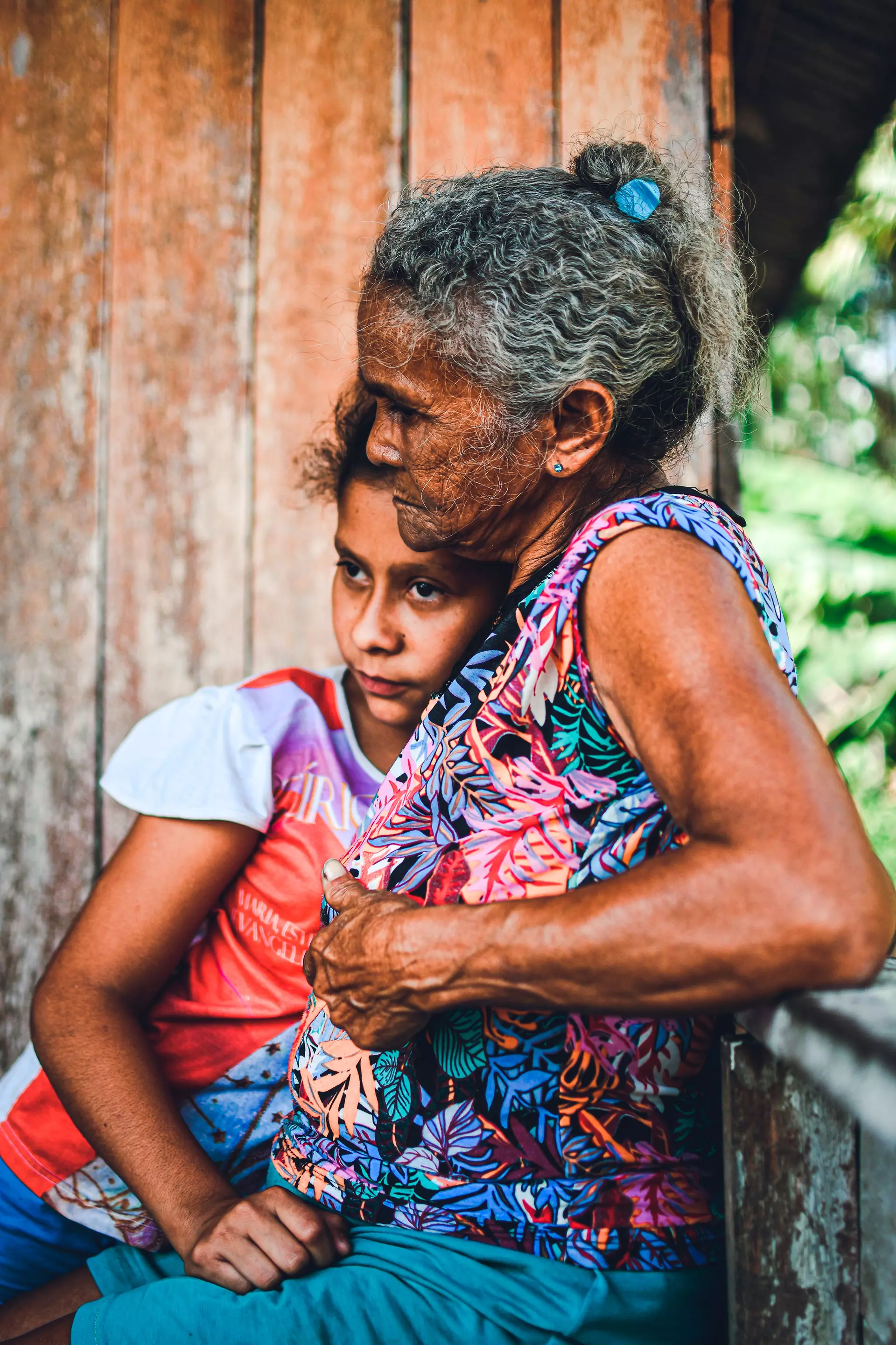
A aposentada dona Delaide, mãe de José, e uma das netas: a família nunca ouviu falar da distribuição de cestas básicas. Foto: Jacy Santos/Ondejacyviu
José Coaraci Souza, his wife Michele and their four children live on the banks of the river, surviving on the money they receive from the Auxílio Brasil government welfare program, the sale of açaí at harvest time, and the flour they make. José’s retired mother, dona Delaide, helps out her son, daughter-in-law and children a lot. If they knew about the handouts of basic food packages, they’d try and get one, but no one has ever told them about them. “Sometimes we have no food. With the rising prices, life has become even more difficult,” says José.
The report of the ‘Abrace o Marajó’ program for 2020, lists a donation of 19.5 tons of animal protein to 19,000 families — 1.5 kilos per family for the whole year — donated by Marfrig along with other companies, such as the Carrefour Group. In total, the program claims to have delivered 18,500 basic food baskets to the populations of the municipalities of Chaves, Afuá, Breves, Portel and Melgaço. When we contacted them to find out if they had any control over the effectiveness of the donations, to be sure they had actually reached the population, Marfrig did not respond to our inquiries, while Carrefour cited “a lack of time” as justification for not answering our questions.
Without evidence, Damares’ accusations regarding alleged violence against Marajó’s children are seen by many as a political maneuver. For sociologist Alcir Borges, who is the supervisor of the regional office of the State of Pará’s Technical Assistance and Rural Extension Company in Marajó, Damares’ speech creates a calculated distraction. “I believe Damares knows what she is doing. Her speech [about children] was designed to create a smoke screen to cover up Bolsonaro’s lack of policies for the region, and she said that in a place where she knew it would have repercussions,” he says. “Here, in Marajó, what the children need is full-time school, and public policies. If we have any actions nowadays, it is down to the funds provided by the state government.
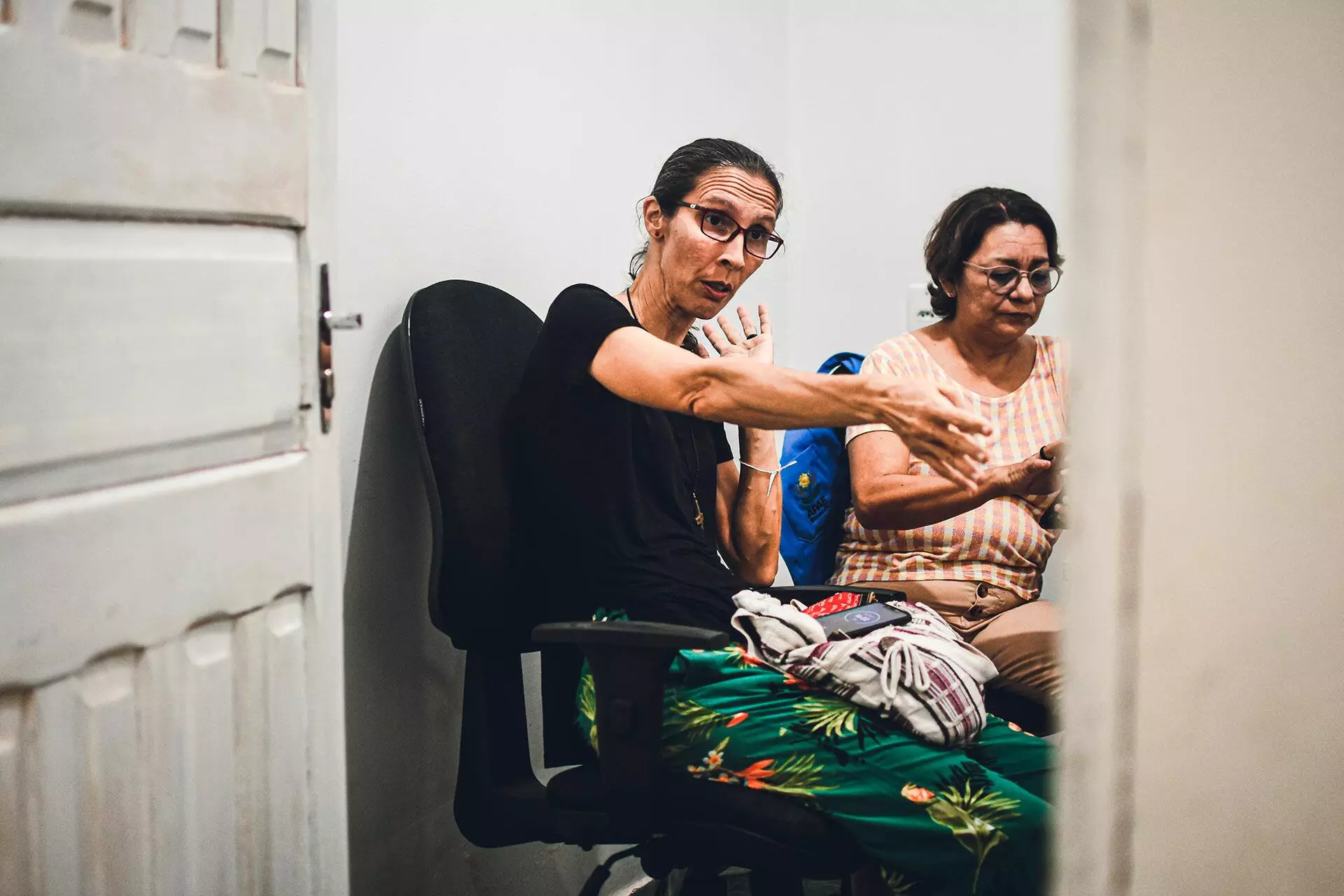
‘As pessoas não são pobres ou nascem pobres, elas são empobrecidas pelas condições sociais a que são submetidas’, diz irmã Carla Vasconcelos. Foto: Jacy Santos/Ondejacyviu
Sister Carla Vasconcelos, from the Brazilian Justice and Peace Commission, says that the region has problems, “social issues that need to be resolved via public policies, including among other reasons because we have one of the worst human development indexes in Brazil, but nothing as awful as Damares said. Luce Mara Lobato, from the Justice and Peace Commission, reminds us this is not the first time that Damares has used Marajó for her ideological interests. She does this to stir up an uproar in the country, so that she can come along and be Brazil’s savior, proposing outlandish actions,” he says. “It’s the same thing we saw in the case of the panty factory,” he recalls. In September 2019, in Damares’ first year as minister, she made another serious complaint related to Marajó, declaring the high incidence of rapes in the region was due to the fact that children in Marajo “did not wear panties.” As a solution, she proposed to set up a panty factory in the region.
Suena Mourão, federal advisor of the State of Pará’s Bar Association (OAB) and vice president of the OAB’s National Equality Commission, says if the allegations are true, without any practical steps having been taken by the ministry, the former minister may have to answer for the crime of malfeasance, as provided in Article 319 of the Penal Code: “to delay or fail to carry out, to carry out improperly, an official act, or to carry it out in contravention of an express legal provision, to satisfy personal interest or feeling. “This is because Damares, while she was the minister, would have been aware of the occurrences, but has only made them public at this time,” the advisor says. SUMAÚMA contacted the Ministry of Women and Human Rights for a response to the accusations related to the senator-elect. At the time of publication, there was no reply but we remain open to a response.
If Damares does not prove the truthfulness of the accusations, she could also be held responsible. “If it is proven that the accusations are untrue, it may be considered an electoral crime, with the aim of fueling hate speech and disrupting the electoral process, by means of the spreading of fake news with a specific focus on the intention of electing another person – in this case, President Jair Bolsonaro,” the legal expert explains.
“She is a risk to everything that black women seek to protect: safety, physical and emotional integrity, and the protection of the rights of our children and teenagers,” Mourão says. “Her speeches show deep racism, because she always refers to Marajó’s children and teenagers with a certain stereotyped attitude.”
Through the Ministry of Women, Family and Human Rights, on October 18th Damares asked the Federal Prosecutor’s Office for Citizens’ Rights for an extension of a further 30 days to prove her accusations. The request was granted. As a result, Damares Alves, Bolsonaro’s former minister and senator-elect for the Republicans, will be able to keep repeating serious accusations in order to benefit the candidate Jair Bolsonaro, without having to prove what she says, right up until election day.





